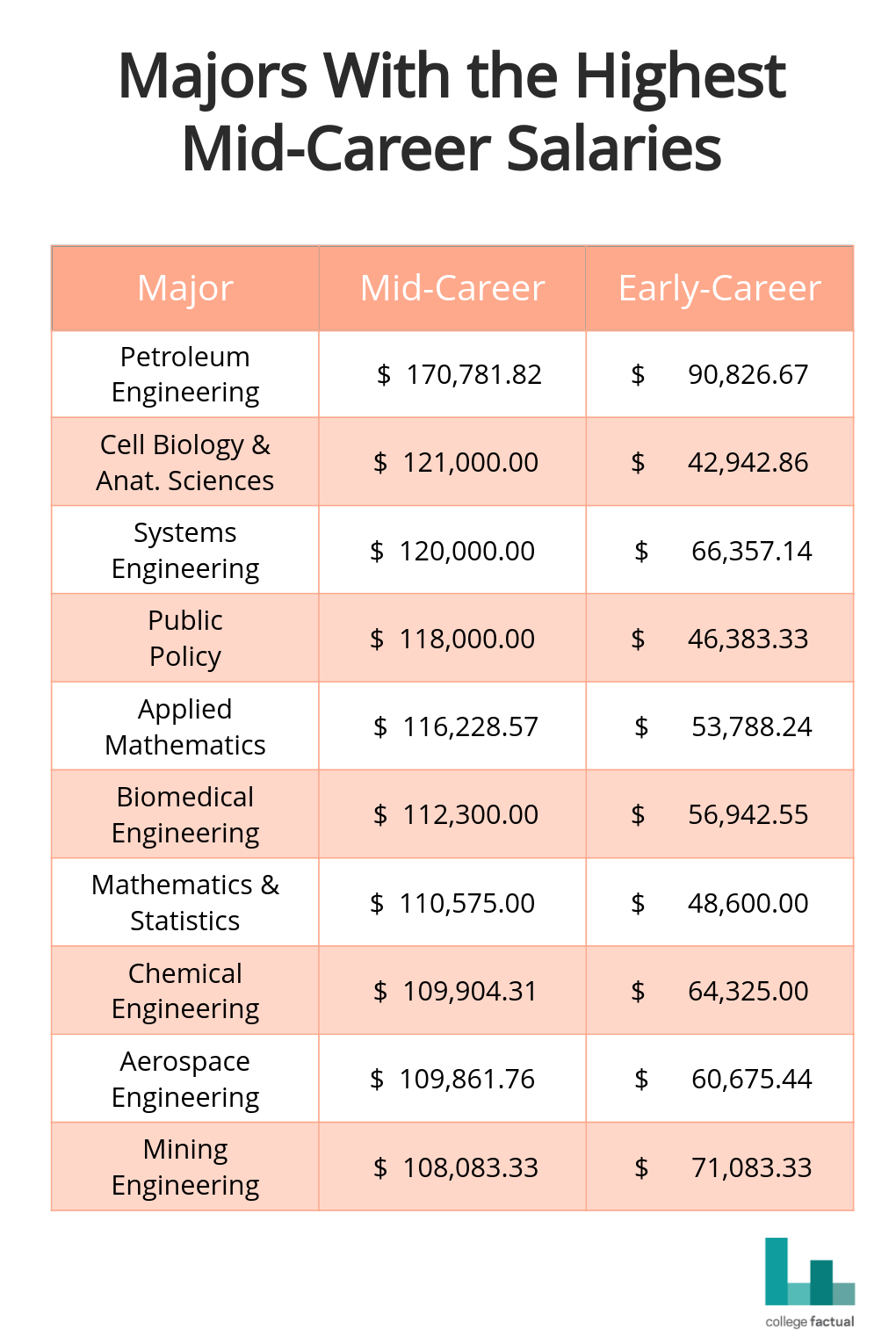Things You Can Do in College to Increase Your Future Salary Potential
/A few extra dollars in your monthly paycheck doesn’t mean much, right? Well, that’s not exactly true when you add up those dollars over several years.
For instance, if you make just $200 more a month, that equates to an extra $2,400 a year. Over a 30-year career, that turns into $72,000. And that figure could be a whole lot higher if you invest the extra money in your retirement fund each year. Or, it could help you pay off your student loans earlier.
Of course, there are some fields of study that lead to better-paying jobs than others. As an example, the table below shows the top 10 majors with the highest mid-career salaries.
Salary estimates made with data from Payscale.com
But what if you don’t want to major in those areas? There are still several ways you can maximize your future career earnings while in college.
1. Know which majors lead to the highest-paying jobs AND are a good match for your strengths.
You shouldn’t pick a major solely based on future salary estimates, but earnings potential is one of the factors you may want to consider. But remember that first and foremost, the major you choose should be a good fit for your interests and strengths.
For instance, if you love math, you don’t necessarily need to major in it. Instead, you could major in an area that is math-centric, such as engineering, computer science, or economics.
If you’re not sure what all your options are, take an assessment such as Majors Matcher. It can help you determine all majors that are an ideal match for you. You might even find out about a few majors you hadn’t thought of before.
2. Research colleges to see which ones are the best for your major.
The best schools in the country aren’t necessarily the best ones for your major. For instance, Molloy College in Rockville Centre, New York is ranked as the best college in the United States for nursing in 2018, and the nursing graduates from Columbia University in the City of New York earn the highest average starting salaries in the field.
Neither of these schools is in the top ten overall best colleges in the country. In fact, for the best overall list, Columbia comes in at number 25 and Molloy sits in the 298th spot.
3. Consider schools that have a low student to faculty ratio to give you a better opportunity to interact with your professors.
Your professors are more than just teachers. They have connections with all sorts of other people, including faculty at other schools, former students, and leaders in the local community. When you work closely with a professor, there’s a very good chance that they will use their network to help you at job-hunting time.
Remember, your professors want you to be successful. On top of opening their network to you, they will have lots of advice to give to you on everything from resume writing and job interviewing to knowing which types of jobs are most likely to interest you.
4. Take one or more classes outside your major and list them individually on your resume.
Some people will tell you not to do this, because taking classes outside your major may lengthen the time it takes you to complete your degree. Sure, this is a possibility if you take a lot of classes that are unnecessary for your major, but if you make good use of your free electives, this won’t be a problem at all.
If you’re a business major, consider taking an extra course in statistics or communication. Engineering major? Take a course in sociology or some other area that will strengthen your soft skills.
These extra skills are very attractive to employers and will make your resume stand out from the others submitted for the job you want. The professor of the course may even be willing to write you a recommendation.
If you’re not sure which additional class would help the most, talk to your advisor or another professor in your department.
5. Utilize your college’s career services center.
Your school’s career services center is one of the best resources available for helping you find a job. In addition to having a jobs board with all types of opportunities to apply for, they also offer services such as resume writing assistance, interview advice, and salary negotiation tips.
Despite this, less than 20% of undergraduates take advantage of these resources for advice on finding jobs. Since these services are typically free, what do you have to lose?
Get started finding your best college and major match with your free College Factual account.








